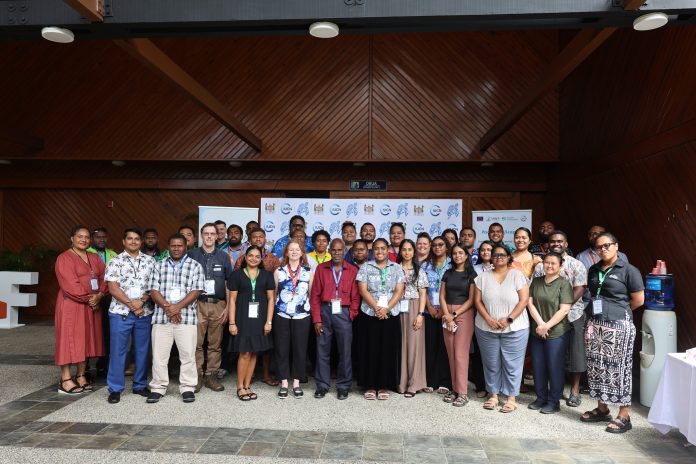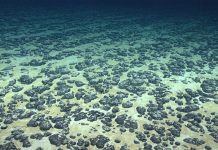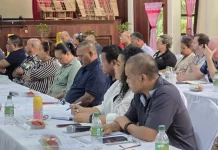International Union for Conservation of Nature(IUCN) director general, Dr Grethel Aguilar, has called for immediate action to address the twin crises of biodiversity loss and climate change, highlighting the severe impacts already being felt in Oceania.
Addressing conservationists, government officials, and IUCN members from across the region Monday, Aguilar emphasised that 2023 was a critical tipping point, with temperatures reaching record-breaking highs.
“2023 was the hottest year ever recorded, and the impacts are being felt deeply here in Oceania.
“The changing climate threatens to undo much of the progress we have made in reducing poverty and protecting biodiversity. We are at a critical juncture in history—there is no time to waste,” said Aguilar.
The IUCN Oceania Regional Conservation Forum, co-hosted by the Fijian government, brings together 49 members from the region to discuss solutions for urgent environmental issues and to lay out a path for future conservation efforts. Aguilar, who last visited Suva for the 2019 Oceania Forum, praised the region for its leadership in conservation but warned that current global efforts are insufficient.
“Oceania is IUCN’s largest region by geography, and it is home to some of the world’s most precious natural beauty—endemic species, incredible oceans, and delicate ecosystems that support your communities.
“But these ecosystems are fragile, and without immediate action, the risks of irreversible damage grow larger every day,” said Aguilar.
Aguilar acknowledged the contributions of Indigenous knowledge and the tireless efforts of local conservationists, underscoring the region’s importance in global environmental protection.
“Your commitment to people and the planet is admirable, and it reminds us why we come together—to protect nature and inspire action,” she said.
One of the key goals of the forum is to shape IUCN’s future strategic direction. For the first time ever, members of the Oceania forum will have the opportunity to help craft a new 20-year strategic vision for the Union, setting the tone for global conservation efforts over the next two decades.
“This is a unique opportunity to reimagine the future of conservation and IUCN itself.
“You, as members, will decide what that future looks like. Over the next few days, you will shape a new vision for how we can equitably protect nature and sustainably manage our precious natural resources,” Aguilar said.
In addition to long-term strategy, the forum will provide input for IUCN’s next four-year programme, which will set out specific actions to begin delivering on that vision. Participants will also discuss critical motions that will be debated at the World Conservation Congress in Abu Dhabi in 2025. These motions will help shape the global conservation agenda.
Aguilar also encouraged participants to showcase their conservation efforts through IUCN’s Contributions for Nature platform, a tool designed to highlight members’ work and demonstrate how local actions contribute to global environmental goals.
“The platform aims to be a powerful demonstration of our Union’s impact,” Aguilar explained. “I invite all our members to add at least one entry to the platform before the end of this forum. Your incredible actions deserve to be recognised on the global stage.”
The urgency of the climate crisis was a central theme in Aguilar’s remarks. She painted a sobering picture of the challenges ahead but also expressed hope that the forum could drive real change.
“Despite our collective efforts, biodiversity loss and climate change continue to accelerate,” Aguilar said.
“The impacts of the changing climate, felt so strongly here in Oceania, threaten to roll back any progress we’ve made. There is still much to be done, and it is our responsibility to act now.”
Aguilar highlighted the region’s vulnerability to climate change, pointing to the rise in natural disasters and the depletion of marine ecosystems as evidence that urgent intervention is necessary.
“The world is looking to us to lead the charge in protecting our planet’s biodiversity,” she said. “This forum is an opportunity to accelerate action where we know we must do more. Let’s use it.”
The forum’s outcomes will be critical as the IUCN prepares for the 2025 World Conservation Congress in Abu Dhabi, where global leaders will debate motions crafted during the Oceania forum.
Aguilar noted that Oceania’s voice is essential in shaping the global conservation narrative and ensuring that the region’s unique challenges are addressed on the world stage.
“It is critical to have this discussion in Oceania—a region with deep knowledge, immense diversity, and true examples of conservation excellence,” Aguilar said. “I count on your wisdom and your voices to lay out the path ahead. Together, we can show the world what we can achieve when we work as one UNION.”
As the forum continues over the coming days, participants are expected to share case studies, exchange knowledge, and forge new partnerships aimed at driving the conservation agenda forward.
“I am proud to work alongside you, our members and partners, to show the world what we can do when we work together. The future of conservation depends on all of us.”
The IUCN Oceania Regional Conservation Forum is set to continue its discussions, with key sessions focused on climate resilience, ecosystem protection, and community-driven conservation efforts. Participants will also explore how the region can align its local actions with international commitments, such as the Paris Agreement and the Convention on Biological Diversity.
In the face of mounting environmental challenges, the forum offers a critical opportunity for Oceania to demonstrate leadership and innovation in the fight to protect nature.













